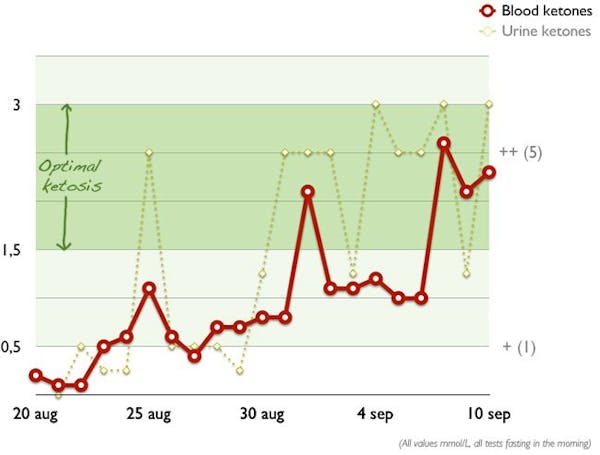Experiment: Higher ketone levels for weight loss and improved performance

Can measuring ketones help you lose weight and improve performance? Let’s try to find out.
Today my ketone experiment reached goal #1: achieving a higher level of ketosis*.
After getting my blood ketone meter I’ve eaten a stricter LCHF diet than I usually do. More fat, fewer carbs. No bread, no potatoes, pasta, rice, or fruit. Instead, I’ve eaten meat, fish, vegetables, egg, and extra-large amounts of high-fat sauces and butter. In the mornings coffee with plenty of butter/coconut fat in it. I’ve occasionally cheated with some nuts, root vegetables, berries, cream, and a little wine.
After just a few days I entered nutritional ketosis (over 0.5 mmol/L on the meter). But it took a full three weeks to achieve stable higher ketone levels (1.5 – 3 mmol/L) in the mornings. It was also interesting that it was much quicker to get high ketone readings during the daytime and in the evenings (data not shown in the chart above).
I’ve also tested keto sticks for measuring urine ketones (cheaper and simpler). In my case, the results so far track the blood ketones reasonably well, even if urine ketones is a more inexact and unreliable test.
So what do you think I’ve noticed? Does it feel different? What do you think happened to my weight & waist measurement (I started at a normal satisfactory weight) and training/mental performance? Answers are coming up, but feel free to guess in the comments!
Ketosis
*/ Ketosis is a natural state where the body is almost only burning fat.The secret of ketosis is to eat very low amounts of carbs and only moderate amounts of protein. Then add fat to satiety.
Some less informed people still confuse natural ketosis with the pathological state ketoacidosis. The latter has completely different causes, usually extreme insulin deficiency in type 1 diabetics. In this dangerous state, the ketone concentrations are around ten times higher than in normal ketosis, and the blood sugar is sky-high.
Natural ketosis due to low-carb eating is perfectly safe with stable well-controlled blood sugar and well-controlled blood ketones.